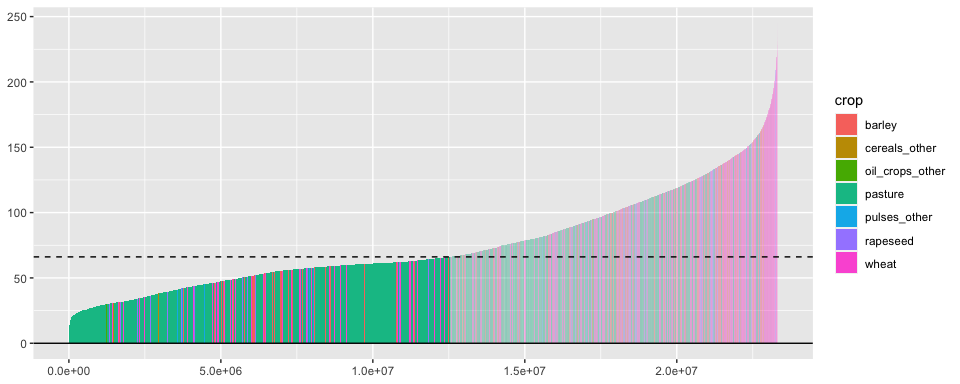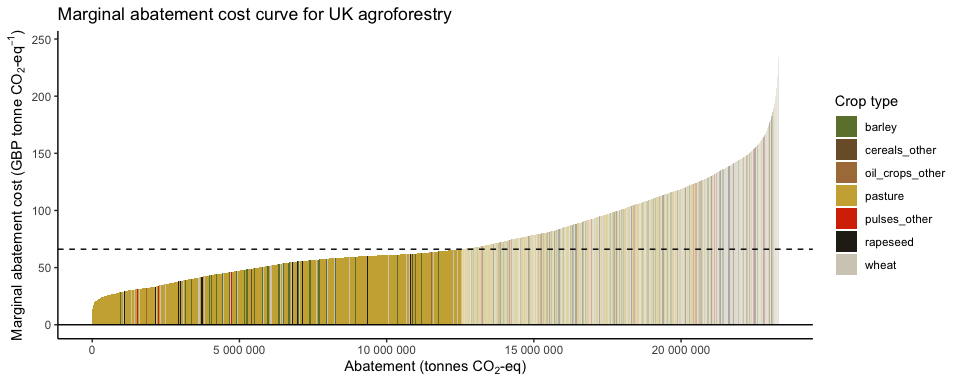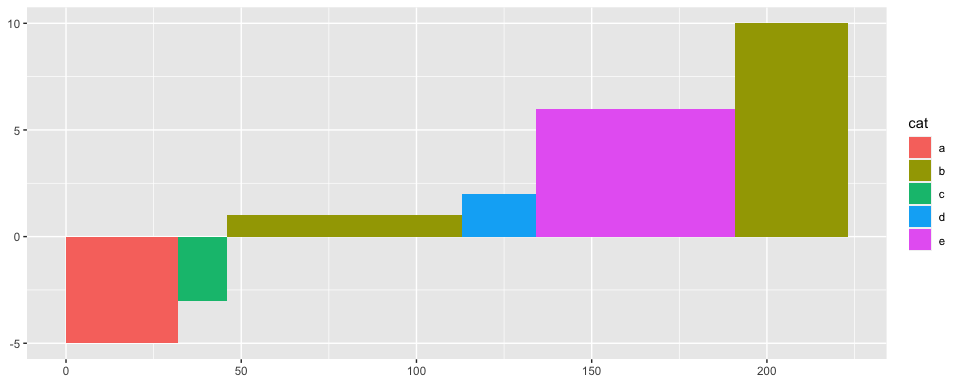Dr Alasdair Sykes 16/11/2020
Marginal abatement cost curves (MACCs) are a data visualisation and decision tool used in the economic analysis of pollution (typically greenhouse gas emissions) abatement. A MACC is an easy-to-read visualisation of a series of mitigation measures vs. a baseline (usually business-as-usual) contextualised by economic cost.
In pure data visualisation terms, MACCs are a little special and so most
off-the-shelf graphing packages (e.g. MS Excel) struggle to produce
them. This small and simple package brings together a group of functions
which make use of the ggplot2 environment (and specifically
geom_rect) to draw simple, clear and attractive MACCs with the minimum
of fuss for the user.
This package was imagined and written by Dr Alasdair Sykes (@alasdair_sykes). If you use this package in your work, please cite it as:
Sykes, A. J. (2020) ggmacc: Easy marginal abatement cost curves with
ggplot2. Version 1.0.0. Available at
https://github.com/aj-sykes92/ggmacc.
This package is hosted on Github and can be installed using the
devtools package:
# install.packages("devtools")
devtools::install_github("aj-sykes92/ggmacc")Note: If this doesn’t work, update
devtools, as Github recently changed the term it uses for the primary version of a source code repository.
This package is comprised of three functions; one (macc_prep) for
preparation of a raw dataset for plotting, one (geom_macc) for adding
the MACC geom to a ggplot object, and one (ggmacc) which brings
these together with other functional elements for an ‘out-of-the-box’
marginal abatement cost curve plot.
The package also contains two datasets; a small, fiction dataset
(small_example) for demo purposes, and a larger dataset based on real
analysis (uk_agroforestry).
The ggmacc function provides a fully developed ggplot-based MACC plot
with all the trimmings:
social_cost_of_carbon <- 66.1
full_macc <- uk_agroforestry %>%
ggmacc(abatement = co2_tyear, mac = mac_gbp_tco2, fill = crop, cost_threshold = social_cost_of_carbon,
zero_line = TRUE, threshold_line = TRUE, threshold_fade = 0.3)
full_maccI’ve avoided replicating any ggplot2 functionality unnecessarily.
However, the output is a ggplot object, so refinements can be added
with the usual syntax:
full_macc +
scale_x_continuous(labels = scales::number_format()) +
scale_fill_manual(values = Manu::get_pal("Kea")) +
labs(title = "Marginal abatement cost curve for UK agroforestry",
fill = "Crop type",
x = expression("Abatement (tonnes CO"[2]*"-eq)"),
y = expression("Marginal abatement cost (GBP tonne CO"[2]*"-eq"^{-1}*")")
) +
theme_classic()Thanks to the very cool
Manupackage for providing this colour palette — find it at https://github.com/G-Thomson/Manu.
The two base functions wrapped in ggmacc have been designed to work
with a typical tidyverse workflow and use tidy evaluation. They are
made available to allow the user to fully manipulate the basic elements
of this package. Pipe data into macc_prep and identify the variables
which characterise abatement and cost; pipe into ggplot and add
geom_macc to the result. geom_macc also takes a fill argument:
small_example %>%
macc_prep(mac = mac, abatement = abatement) %>%
ggplot() +
geom_macc(fill = cat)It’s worth noting this is a slight perversion of the ggplot2
grammar-of-graphics philosophy in that geom_macc does not exist
separately from its aesthetics — the aes() arguments are tied up in
the function call — however, for flexibility and ease of use, this
seemed like the best approach. The result can be augmented and refined
in the same way as any other ggplot object. This disaggregated syntax
also allows the user opportunity to modify the base data following
macc_prep if desired.
Thanks to Defra and the Natural Environment Research Council for
providing projects and questions which led to the original development
of the code in this package. The package is based around tidyverse
ideas and functions, so thanks go also to Hadley Wickham and the
tidyverse team for building and maintaining this incredible environment.
If you would like to contribute to this package, please file an issue, make a pull request on GitHub, or contact the author on Twitter @alasdair_sykes.


